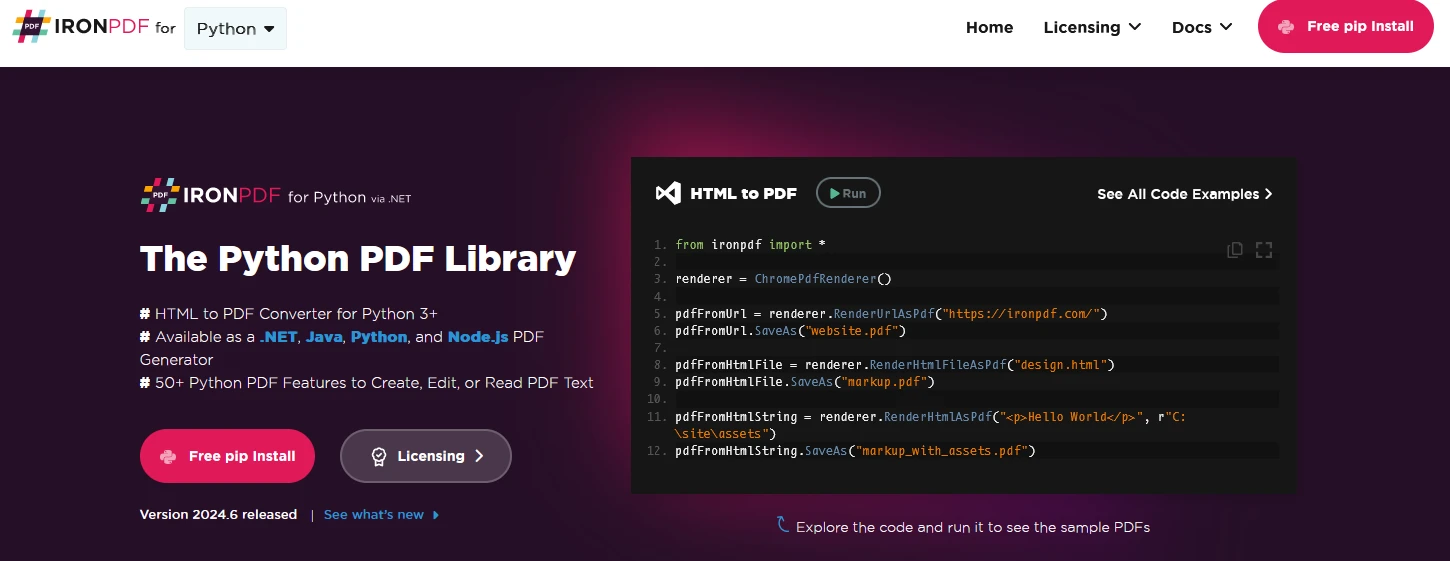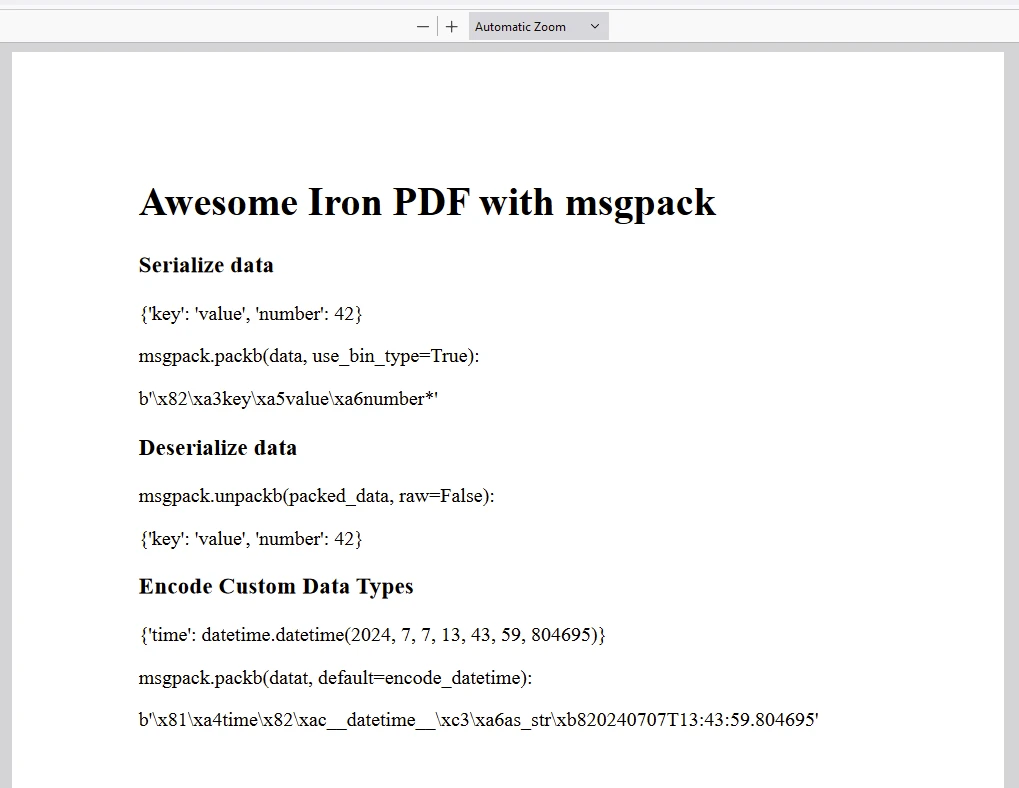Test in production without watermarks.
Works wherever you need it to.
Get 30 days of fully functional product.
Have it up and running in minutes.
Full access to our support engineering team during your product trial
MessagePack is an efficient binary serialization format that allows data exchange among multiple languages, it is similar to JSON but faster and more compact. The msgpack library in Python provides the necessary tools to work with this format, offering both CPython bindings and a pure Python implementation.
Before you can start reading and writing messagepack data, you need to install the msgpack library, which can be done using pip:
pip install msgpackHere is a simple example of how to use MessagePack to serialize and deserialize data:
import msgpack
# Serialize key value pairs or file like object
data = {'key': 'value', 'number': 42}
packed_data = msgpack.packb(data, use_bin_type=True)
# Deserialize data
unpacked_data = msgpack.unpackb(packed_data, raw=False)
print(unpacked_data)import msgpack
from io import BytesIO
# Create a buffer
buf = BytesIO()
for i in range(100):
buf.write(msgpack.packb(i))
buf.seek(0)
unpacker = msgpack.Unpacker(buf)
for unpacked in unpacker:
print(unpacked)import datetime
import msgpack
# uses default sequence type
def encode_datetime(obj): # default value
if isinstance(obj, datetime.datetime):
return {'__datetime__': True, 'as_str': obj.strftime('%Y%m%dT%H:%M:%S.%f')}
return obj
def decode_datetime(obj):
if '__datetime__' in obj:
return datetime.datetime.strptime(obj['as_str'], '%Y%m%dT%H:%M:%S.%f')
return obj
data = {'time': datetime.datetime.now()}
packed_data = msgpack.packb(data, default=encode_datetime)
unpacked_data = msgpack.unpackb(packed_data, object_hook=decode_datetime)
print(unpacked_data)
IronPDF is a powerful Python library designed to create, edit, and sign PDFs using HTML, CSS, images, and JavaScript. It offers commercial-grade performance with a low memory footprint. Key features include:
Convert HTML files, HTML strings, and URLs to PDFs. For example, render a webpage as a PDF using the Chrome PDF renderer.
Compatible with various .NET platforms, including .NET Core, .NET Standard, and .NET Framework. It supports Windows, Linux, and macOS.
Set properties, add security with passwords and permissions, and apply digital signatures to your PDFs.
Customize PDFs with headers, footers, page numbers, and adjustable margins. Supports responsive layouts and custom paper sizes.
Adheres to PDF standards such as PDF/A and PDF/UA. Supports UTF-8 character encoding and handles assets like images, CSS, and fonts.
import msgpack
import datetime
from ironpdf import *
# Apply your license key
License.LicenseKey = "key"
# Serialize data
data = {'key': 'value', 'number': 42}
packed_data = msgpack.packb(data, use_bin_type=True)
# Deserialize data
unpacked_data = msgpack.unpackb(packed_data, raw=False)
print(unpacked_data)
#Custom Data Types
def encode_datetime(obj):
if isinstance(obj, datetime.datetime):
return {'__datetime__': True, 'as_str': obj.strftime('%Y%m%dT%H:%M:%S.%f')}
return obj
def decode_datetime(obj):
if '__datetime__' in obj:
return datetime.datetime.strptime(obj['as_str'], '%Y%m%dT%H:%M:%S.%f')
return obj
datat = {'time': datetime.datetime.now()}
packed_datat = msgpack.packb(datat, default=encode_datetime)
unpacked_datat = msgpack.unpackb(packed_datat, object_hook=decode_datetime)
print(unpacked_datat)
renderer = ChromePdfRenderer()
# Create a PDF from a HTML string using Python
content = "<h1>Awesome Iron PDF with msgpack</h1>"
content += "<h3>Serialize data</h3>"
content += "<p>"+str(data)+"</p>"
content += "<p> msgpack.packb(data, use_bin_type=True):</p><p>"+str(packed_data)+"</p>"
content += "<h3>Deserialize data</h3>"
content += "<p> msgpack.unpackb(packed_data, raw=False):</p><p>"+str(unpacked_data)+"</p>"
content += "<h3>Encode Custom Data Types</h3>"
content += "<p>"+str(datat)+"</p>"
content += "<p> msgpack.packb(datat, default=encode_datetime):</p><p>"+str(packed_datat)+"</p>"
pdf = renderer.RenderHtmlAsPdf(content)
# Export to a file or Stream
pdf.SaveAs("Demo-msgpack.pdf")This script demonstrates the integration of msgpack with IronPDF for serializing and deserializing data, as well as creating a PDF document from HTML content.
Serializing Data with msgpack:
Deserializing Data with msgpack:
Custom Data Types Handling:
HTML Content for PDF Generation:
Constructs an HTML string (content) that includes:
Header and subsections detailing the serialized data (data and packed_data).
PDF Generation with IronPDF:
Saving the PDF:


IronPDF runs on the license key for python. IronPDF python offers a free trial license key to allow users to check out its extensive features before purchase.
Place the License Key at the start of the script before using IronPDF package:
from ironpdf import *
# Apply your license key
License.LicenseKey = "key"MessagePack is a powerful tool for efficient data serialization in Python. Its compact binary format, cross-language support, and ability to handle custom data types make it a versatile choice for various applications. Whether you are working on data interchange between different systems or optimizing the performance of your data processing tasks, MessagePack offers a robust solution.
IronPDF is a versatile Python library designed for creating, manipulating, and rendering PDF documents directly from Python applications. It simplifies tasks such as converting HTML to PDF, creating interactive PDF forms, and performing various document manipulations like merging and splitting PDF files. With seamless integration into existing web technologies, IronPDF offers developers a powerful toolset for generating dynamic PDFs, enhancing productivity in document management and presentation tasks.